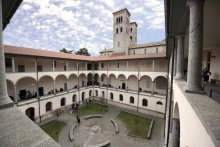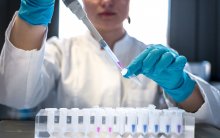The research focus of the Dipartimento di Biotecnologia e scienze della vita – DBSV concerns the well-being of humans, animals and the environment. In particular, the Biological Sciences and Technologies Section promotes innovative strategies in the most advanced sectors of industrial, biomedical, diagnostic, animal, plant, microbial, cellular and molecular biology and biotechnology also aimed at the production of goods and services, while the Medical and Surgical Sciences Section carries out clinical and research activities with the aim of improving the patient’s well-being.
The Dipartimento di Diritto, economia e culture – DiDEC pursues scientific purposes of a multi and inter-disciplinary nature thanks to the particularity of its training offer which, unique in Italy, allows to combine the studies in law with those of economic problems and those of interlinguistic and intercultural mediation, favoring mutual integration.
In particular, the Department aims to ensure, both in terms of research and in terms of training, the comparative and integrated study of social phenomena, analyzed in their normative, cultural and socio-economic meaning, as well as in the linguistic expression in which they manifest themselves, with specific attention to historical evolution and to the social contexts in which they are inserted.
The cooperation between different sectors has already produced appreciable positive results in the short life of this Department. In particular, it was possible to connect the study of multilingualism to the needs of economics and business and the study of coexistence and integration between different legal systems, cultures, languages and religions to that of the mechanisms for resolving conflicts and disputes, with attention to procedural, mediation-conciliation and reparative mechanisms.
The research activity of the Dipartimento di Economia – DiECO revolves around the economic, business, legal and mathematical-statistical disciplines that characterize the educational offer of the Department itself.
In the autonomy of the individual scientific areas, the possibility of interdisciplinary comparisons in various research areas represents an important resource whose validity has been tested in the didactic field and which is progressively enhanced also in the research field.
The research activity of the Dipartimento di Medicina e chirurgia – DMC is mainly focused on the study of oncological diseases, cardiovascular diseases, neuro- and immunopharmacology; the activity is divided into research centers and focused research groups that carry out their research on specific topics in which professors and researchers from other departments and other universities participate, ensuring the integration and construction of common projects. In all these areas a strong interaction emerges between basic sciences and clinical sciences, an interaction that represents an important strength for the development of innovative research programs of national and international relevance.
The Dipartimento di Scienza e alta tecnologia - DiSAT pursues the goal of harmonizing basic research with applied research, basing its raison d'être on a unified vision of scientific and technological research. The Department was created around the idea of combining hard sciences, or STEM (Science, Technology, Engineering, Mathematics) in a single research environment, without neglecting contributions from other disciplines, with the idea of promoting interdisciplinary research and to train students with a global scientific vision. Furthermore, this choice allowed us to be able to count on the advantages of scale usually possible only in large universities, without losing the agility of a small structure.
The research areas are represented by four Sections: Environment-Health-Safety-Territory, Chemistry, Physics, Mathematics.
The research activities of the Dipartimento di Scienze teoriche e applicate - DiSTA are developed around three Sections: Environment, Computer Science and Humanities.
In the current context of globalization and internationalization, among the most innovative and peculiar aspects of the research activity of the Department - in parallel with the advancement of each single subject area - there are consequently the richness of the research topics of the teachers and the tendency to create virtuous multidisciplinary paths also open to numerous and fruitful national and international collaborations, often integrated with teaching activities.
The primary vocation of the Dipartimento di Scienze umane e dell'innovazione per il Territorio – DiSUIT is to integrate scientific research and the needs of the Como and Varese territories. Through an interdisciplinary approach which constitutes its essential feature, DiSUIT favors the ability to determine positive effects on society, also thanks to the funding it has been able to attract from various entities such as MIUR (the italian Ministry for Education, University and Research), the Volta Foundation and the CARIPLO Foundation.
Please find our Departments’ scientific equipment in the attached file.
In every Department an internal Committee for the Quality of Research (Commissione AIQUAR) pomotes the quality assurance of research and "third mission" (Public engagement, Technology Transfer and other activities involving the society) by collecting and analysing data and conducting a self assessment concerning the outcomes of the activities.
See the composition of Departmental Committees (in Italian).
The University promotes the policy of open access to research results in terms of publications and doctoral theses. Establishing an institutional repository allows scientific information produced in Uninsubria to be made available to the wider academic community and offers greater visibility and greater impact to this globally accessible material on the Internet.
The institutional repository of the University Research is IRInSubria: https://irinsubria.uninsubria.it/
From 2020 lRInSubria also stores information connected to research and third mission:
- IRIS-RM is the section which allows to gather information on the scientific CV of professors/researchers and on related human and infrastructural research resources, international mobility, training activities and Public Engagement.
- IRIS-AP is the section which gathers information on projects, agreements and research contracts.
From 2023, lRInSubria information can also be consulted via Uni-Find: https://uninsubria.unifind.cineca.it/
For more information, visit the pages dedicated to Open Access.

IRInSubria collects, stores, documents and disseminates information on the scientific production of the University of Insubria since 2015, also for the purposes of research evaluation.
This University research product catalog is in fact the only source of data for both internal and external evaluation and also automatically populates the italian Ministry for Education, University and Research (MIUR) research catalog.
University professors, researchers and PhDs are automatically enabled to log in, using the University credentials (username and password).
The University of Insubria promotes and enhances research also in its international and interdisciplinary dimension: there are numerous research projects funded on local, national and European competitive calls that initiate or consolidate collaborations with universities, companies, institutions and associations, thus offering teachers, researchers and students the opportunity to study, specialize and do research, as well as to welcome new researchers in a stimulating environment.
Particular attention was paid to the consolidation and improvement of some tools and support services for the presentation and management of competitive projects, dissemination of information, training in the drafting of project proposals.





